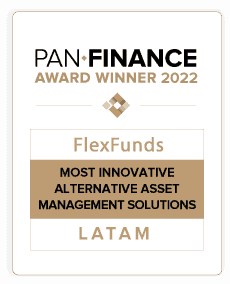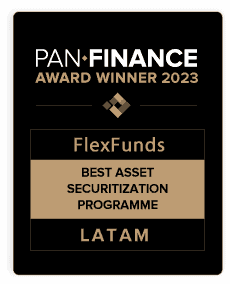- Hedge funds stand out for their flexibility in investment strategies, use of leverage and derivatives, and ability to generate profits even during times of market volatility.
- Asset managers play a crucial role in hedge funds, as they are responsible for making investment decisions and adopting strategies to maximize returns.
- FlexFunds, as a leading provider in the design and issuance of investment vehicles, plays an important role in the evolution of hedge funds by facilitating cost-effective securitization of existing hedge funds.
Hedge funds are an alternative investment vehicle that, through various strategies, seeks to take advantage of different market trends, regardless of whether the market is bearish or bullish These strategies include short and long sales, guided by a Hedge Fund Manager.
The implementation of flexible investment tactics and the use of leverage and derivatives are among the main characteristics of this instrument, in which the managers play a key part by appealing to active investment mechanisms. The work behind these strategies consists mainly of active analysis of global macroeconomic factors and continuous monitoring of asset imbalances, among others.
Hedge funds experienced a boom in the 1990s, and at the beginning of this century, in 2007, the value of assets they managed peaked before plummeting amid the global financial crisis, during which their role was questioned for contributing to the demand for “subprime” mortgages.
Since then, hedge funds have adopted stricter regulations regarding leverage limits or minimum capital requirements, and they are subject to increased supervision by financial authorities in developed markets such as the USA. However, they are still considered to enjoy greater regulatory flexibility compared to their counterparts, mutual funds.
In any case, the recovery of assets under management only occurred in 2013, when they reached $1.8 trillion. A decade later, in 2023, these assets climbed to $5.1 trillion according to the statistics portal Statista1.
Hedge funds stand out for their ability to profit from both increases and decreases in asset value, thanks to short and long sales strategies. In the former case, a short position is taken by selling a borrowed asset, anticipating that its price will decrease in the future. Then, it is repurchased at a lower price, thus generating a profit from the difference. On the other hand, in the long sale strategy, the fund acquires an asset that is considered undervalued, expecting its value to increase over time, allowing for its subsequent sale at a higher price.
These funds stand out for their flexibility in investment strategies, use of leverage and derivatives, and ability to generate profits even in times of market volatility.
The market has matured not only from a regulatory perspective but also as a product within asset managers’ portfolios and in strategy and distribution, explains FlexFunds, a leading provider for asset managers in the design and launch of investment vehicles (ETPs). With a vision focused on simplifying and expanding access to international private banking, FlexFunds seeks to promote the distribution of financial instruments such as hedge funds.
Its focus is on optimizing accessibility, intending to significantly improve the reach of these investment vehicles. FlexFunds’ solutions are designed to streamline the securitization of existing hedge funds, resulting in greater liquidity and wider availability for investors internationally.
In this sense, its ETP “FlexFeeder” is established as a fundamental tool. It allows asset managers to securitize private fund shares, facilitating more efficient global distribution through a “Euroclearable” listed security.
Who invests in this instrument?
Hedge funds are structured and present within the portfolios of asset managers. They focus on accredited individuals and institutional investors, mainly high-net-worth profiles, considering the inherent risk associated with such an alternative tied to market volatility. Initial investments for this instrument are estimated to range from $100,000 to over $2 million.
According to Forbes2, the U.S. Securities and Exchange Commission (SEC) requires accredited investors to have a net worth of at least $1 million, excluding their primary residence or an annual income equivalent to $200,000 or $300,000 for married couples. Accredited investor thresholds have remained unchanged since 1980, the date of their creation.
Despite stricter regulations, hedge funds maintain greater regulatory flexibility than mutual funds, making them attractive to certain investors.
The capital of different investors is managed by a so-called hedge fund manager, who is responsible for making decisions and adopting investment strategies to generate returns at different market stages. Generally, they receive 20% of the fund’s profits. Additionally, the funds have defined management fees ranging from 1% to 2% of the amount invested.
According to SEC figures cited by CNBC3, 18.5% of households in the USA qualified as accredited investors in 2022, a significant increase compared to the 13% recorded in 2019. The SEC estimates that in 1983, only 1.8% of investors qualified as accredited. If the thresholds had been directly tied to inflation, only 5.7% of households would be classified in this category.
What are the rules in hedge funds?
As mentioned, hedge funds often have greater flexibility in regulation, as they were excluded from the definition of an investment company from 1940, according to information from the Fed4. These funds must submit the so-called Form PF, referring to regulatory assets under management, to monitor risks in the financial system.
While funds with at least $500 million in assets under management have this obligation quarterly, smaller funds do it annually. They must submit the form “if they have investment advisers who are registered or required to register with the Securities and Exchange Commission (SEC), manage one or more private funds, and have at least $150 million in private fund assets under management,” according to the SEC.
In conclusion, hedge funds represent an alternative investment vehicle that seeks to capitalize on different trends, exploiting marketplace inefficiencies to generate returns regardless of market conditions.
These funds have experienced periods of growth and crisis throughout their history, but today, they are widely adopted in managers’ portfolios. Over time, and with the implementation of stricter regulations, hedge funds have matured as a product within the investment landscape. FlexFunds, as a leading provider in the design and issuance of investment vehicles, contributes to this evolution by facilitating cost-effective securitization of existing hedge funds, increasing liquidity and accessibility for international investors through its FlexFeeder solution. To learn more, do not hesitate to contact our specialists.
Sources:
- 1 https://www.statista.com/statistics/271771/assets-of-the-hedge-funds-worldwide/
- 2 https://www.forbes.com/advisor/investing/how-to-invest-in-hedge-funds/
- 3 https://www.cnbc.com/2023/12/19/inflation-adds-millions-of-new-accredited-investors-sec-says.html
- 4 https://www.federalreserve.gov/releases/efa/efa-hedge-funds.html







